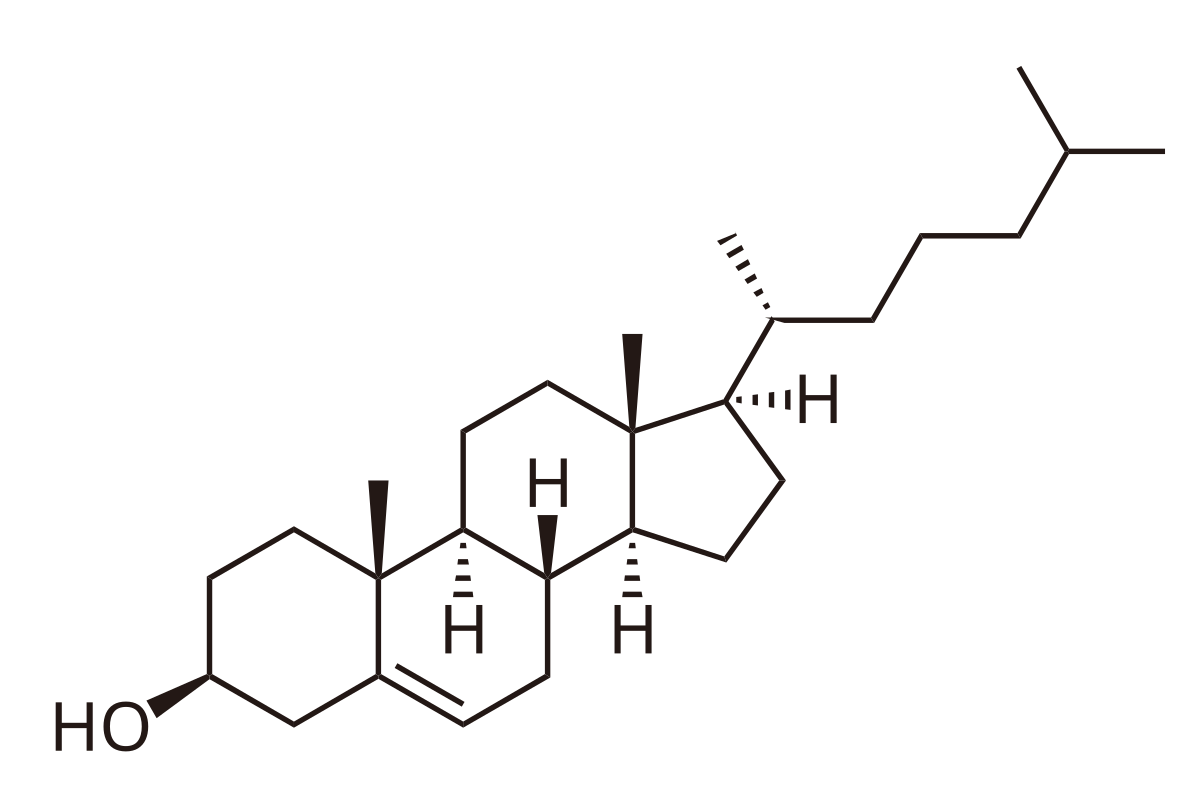10 cholesterol facts
In this article, we will describe 10 facts about high cholesterol. Let’s start with the basics.
 Cholesterol
Cholesterol
1. What is cholesterol?
It is a fat which all humans need to keep healthy. Many different cells make cholesterol. The liver makes about a quarter of the total.
2. What does cholesterol do?
Its function is to help your body make cell membranes, many hormones, and vitamin D. It is not a disease. The picture above is what it looks like as a chemical.
3. How is cholesterol carried around the body?
Cholesterol is carried in the blood by particles called ‘lipoproteins’. When ‘low-density lipoproteins’ (LDL-cholesterol) carry cholesterol this is referred to as ‘bad’ cholesterol. This is because higher levels of LDL-cholesterol in your blood cause an increased risk of heart disease.
However, some cholesterol in your blood is carried by ‘high-density lipoproteins’ (HDL-cholesterol). HDL-cholesterol can be thought of as ‘good’ cholesterol and higher levels help to prevent heart disease. So it is not simple.

4. What causes a high cholesterol?
Your blood cholesterol level can vary depending on your diet, and other factors (genetic and environmental). Hence different people who eat the same diet can have a different blood cholesterol levels. So, again, it is not simple. Nonetheless, in general, if you eat less fatty food in your diet, the cholesterol level will go down.
5. Risk factors
Age, gender and ethnic background are all factors:
- Being older – having a higher cholesterol increases with age
- Being male – men are more likely to have high cholesterol
- Ethnic background – if you are from a Black or Asian background, you are more likely to have high cholesterol
- Genetic – familial hypercholesterolaemia (FH) is an inherited condition, meaning you were born with it. It can lead to very high levels of cholesterol, even if you do not have other risk factors.
6. Symptoms
High cholesterol usually has no symptoms, so many people do not know that their cholesterol is too high. A simple blood test can check cholesterol levels.
7. Diagnosis
Cholesterol blood levels are needed but must be part of an overall assessment of your risk of heart disease (see below) – i.e. only some patients need treatment. The following blood cholesterol levels are desirable:
- Total cholesterol (TChol): 5.0 mmol/L or less. However, about 2 in 3 adults in the UK have a TChol level of 5.0 mmol/L or above
- LDL-cholesterol: 3.0 mmol/L or less
- HDL-cholesterol: 1.2 mmol/L or more
- TChol/HDL ratio: 4.5 or less. That is, your TChol divided by your HDL-cholesterol. This reflects the fact that for any given TChol level, the more HDL, the better.
As a rule, the higher the LDL-cholesterol level, the greater the risk to health. A blood test only measuring total cholesterol may be misleading. A high total cholesterol may be caused by a high HDL-cholesterol level and is therefore healthy. It is very important to know the separate LDL and HDL-cholesterol levels.
So, how do I lower my cholesterol?
8. What can I do to lower my cholesterol?
Every human has some risk of developing small fatty lumps (atheroma) within the inside lining of blood vessels, which then may cause heart attacks and strokes. However, some factors increase the risk. These include:
- Lifestyle risk factors that can be changed:
- Smoking
- Lack of physical activity
- Obesity
- An unhealthy diet or excess alcohol
- Treatable or partly treatable risk factors:
- High blood pressure (hypertension)
- High cholesterol blood level. However, only LDL-cholesterol is a risk factor. HDL cholesterol is healthy for your body
- High triglyceride (another type of fat) blood level
- Diabetes or kidney diseases that affect kidney function (e.g. chronic kidney disease (CKD) Stage 4 or 5).
Changing from an unhealthy diet to a healthy diet can reduce your LDL-cholesterol level. However, dietary changes alone may not lower LDL cholesterol level enough to change a person’s risk of heart disease.
9. What can my GP do to help?
You may be offered a tablet – usually a ‘statin’ (or HMG-CoA reductase inhibitor) – if you are at increased risk of heart disease.
10. If it is still not controlled, what happens next?
If your GP decides a statin is required but that does not control the cholesterol (they usually do), they may refer you to a ‘Lipid Clinic’ at your local hospital; where you will see a senior doctor (a consultant, or their deputy called a registrar). A second stronger drug may be required.
Summary
We have described 10 cholesterol facts. You can reduce your cholesterol by not smoking, choosing healthy foods, drinking alcohol in moderation, and having regular physical activity, and keeping your weight down.
If that does not bring the cholesterol down, and your doctor thinks you are higher risk, medication (like a statin) may be necessary.

